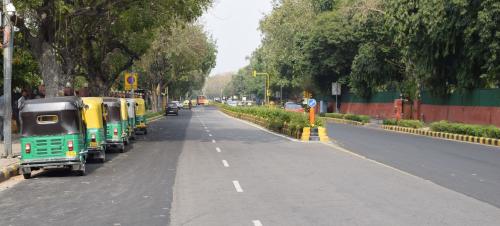India: UN expert raises alarm over mass evictions of Delhi railway track dwellers
An independent UN human rights expert has voiced concern over an Indian Supreme Court order to evict up to 250,000 people living in shacks along railway tracks in the capital, Delhi, warning that such a move could violate the country’s obligations under key international rights treaties.

Deserted streets in the Indian capital, Delhi, during the nationwide lockdown to stop the spread of coronavirus.
Balakrishnan Rajagopal, UN Special Rapporteur on adequate housing, also said that none of those affected, appeared to have been consulted or heard by the Court beforehand, and that the judges had initially ruled that no one should be allowed to seek to overturn the eviction order.
“This amounts to a full-fledged denial of justice for the low income people living along the railway tracks”, Mr. Rajagopal said in a news release on Monday.
“If this is maintained, India will squarely violate article 2.3 of the International Covenant on Civil and Political Rights containing the core human rights principle that everyone can seek judicial relief against any decision she or he considered arbitrary.”
Serious rights violation
Mr. Rajagopal also said that any eviction into homelessness would amount to a serious violation of human rights and of India’s obligations under the International Covenant on Economic, Social and Cultural Rights.
The Supreme Court of India issued the eviction order at the end of August for around 48,000 households living near the tracks, giving occupants three months to leave, according to the news release.
The Court issued a second ruling to temporarily halt the eviction order, a move welcomed by the Special Rapporteur, who, however, added that the four weeks provided would be insufficient to develop any reasonable relocation plan, that would meet international legal standards, for such a large number of households.
Mr. Rajagopal called on the Supreme Court to reconsider the case in light of India’s international rights obligations, noting that the Court has a strong reputation of having previously delivered several landmark human rights decisions.
According to the the UN rights office (OHCHR), the Special Rapporteur has contacted the Indian Government to clarify the issues in question and asked for his concerns to be shared with the Supreme Court.
Ban all evictions in light of COVID-19
To avoid community spread of the COVID-19 virus, Mr. Rajagopal urged the Government to ban all evictions during the pandemic under the country’s National Disaster Management Act or its Epidemics Act.
“While the relocation of some residents living in very close proximity to a railway track may be needed to protect them from potential railway accidents, any such eviction would only be compatible with international human rights law after a relocation plan is developed in consultation with the affected households and after alternative land or housing is made available to them in proximity to their current place of residence,” said Mr. Rajagopal.
Such relocation should however only be considered after the pandemic has been brought under control, as undertaking it now would expose those living in the railway safety zone to additional health risks.
The Special Rapporteurs and Independent Experts are part of what is known as the Special Procedures of the Human Rights Council. The experts work on a voluntary basis; they are not UN staff and do not receive a salary. They are independent from any government or organization and serve in their individual capacity.
Source:United Nations
- 320 reads
Human Rights
Ringing FOWPAL’s Peace Bell for the World:Nobel Peace Prize Laureates’ Visions and Actions

Protecting the World’s Cultural Diversity for a Sustainable Future

The Peace Bell Resonates at the 27th Eurasian Economic Summit

Declaration of World Day of the Power of Hope Endorsed by People in 158 Nations

Puppet Show I International Friendship Day 2020

